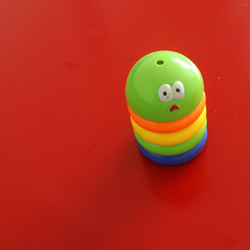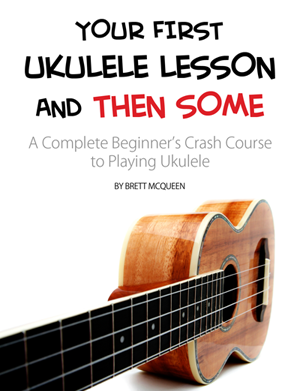I started playing piano when I was six. For quite a few years in my life, I’ve avoided performing like a plague. I remember entering into a talent show in second grade for a piece I learned on piano. I played it for the judge’s panel and they gave me a superior rating (the highest) and then invited me to perform for the entire church. You think that would be a huge vouch of confidence, but I told them, “No way!”
It’s only been in the past few years where I’ve stepped out and started to do more performing. In looking back, I believe I had the competency as a musician to perform, but I think I largely resisted due to a lack of confidence in my abilities.
I imagine there are many of you out there who probably have competent ukulele skills but the thought of performing for a group of people scares you to death.
Everyone Starts Somewhere
One of the biggest excuses that prevented and still sometimes does prevent me from performing is that “I’m not ready yet.” I will think to myself that I have more to learn, or that I’m not quite good enough yet.
It’s important to enter into any performance prepared (more on that later), but there comes a point where we have to take a leap of faith and trust that what we have right now is good enough. We will never grow as performers unless we do it, and we’re only better off for it.
Who Are You Trying to Impress?
Playing music and sharing it with others is not about impressing other people. It’s not about what they think about you as a musician. It is about you expressing something that you need to express and connecting your audience with this. We play music because it’s a part of who we are. We don’t share our music or perform for any other reason but because we feel more alive when we do.
I will admit the disadvantages to thinking this way. Because of this thought process, I sometimes worry, “What if people don’t respond well to my expression through music? What if they don’t like it? What if they don’t get it?” I’ve come to learn that there will always be people who don’t like your music or care for it. And that’s okay. Again, we don’t share our music because people like it or not, but because it’s a part of who we are.
Gain Confidence Through Preparation
While there will always be something more to learn and something more to prepare for in the grand scheme of things, but there is something to be said how it’s important to prepared for the moment you step out in front of a group of people to share your music. Prepare for where you are at right now and the songs you know. Learn them like the back of your hand.
I find the more prepared I am for the songs I’m doing the more comfortable I feel. I can take confidence in my performance because I know that I’ve prepared to the best of my ability.
First, Play for Trusted Friends
Some of the biggest confidence boosts I receive are from close, trusted, and respected friends. I have a couple friends that whenever I write a new song or record a demo, they are the first ones to hear it. I know their feedback is going to be honest and true but also very encouraging. It’s important to find the people in your life that encourage and support you no matter what.

Graciously and Humbly Accept “Failure”
I hesitate to use the word “failure” here because whenever you perform it will never be a failure, even if you don’t feel like it goes very well. If you mess up or hit a sour note, it’s okay. Acknowledge it and then move on. We only become better musicians and artists when we make these mistakes and take the action to learn from them.
I recall one of my least favorite performances. One of my biggest flubs was when I had my first guitar recital at university. I’ve never performed in a setting like that before. I’m use to playing in less formal venues. I was performing a couple of Leo Brouwer’s etudes, which if you aren’t familiar, are really easy pieces to play. I remember practicing them so much that I could play them with my eyes closed.
However, I got out on stage, and I remember completely freezing. My hands shook so horribly, which you might imagine is very counterproductive as a guitar player. I hit so many bad notes, forgot a few measures, and was visibly shaken up. I’ve never experienced this before! How embarrassing. All to say, I was able to have an honest and very humbling conversation with my professor, which leads me to…
What to Do During the Actual Performance
In talking with my professor, we figured out that I had completely forgotten to breathe during my performance. Common mistake apparently. When I stepped out on stage, I was holding my breath. Not consciously of course. When you forget to breathe, this ends up causing a lot of tension in your body, which is my hands started to shake and became stiff.
The best thing to do when it comes time to share your music in front of others, no matter what the setting is, is to take deep, relaxed breaths and smile a lot. In some settings, it can even be freeing to just say, “Hey everyone, I feel nervous. I don’t usually do this, but I’m really excited and honored to be playing this music for you and I hope you enjoy it.” Sometimes acknowledging your feelings to someone can be helpful, especially as a beginning performer.
Overall, have fun. Be yourself. What you bring to the table is awesomely unique and needs to be heard. For real.
What’s Stopping You from Sharing Your Music?
If you play a song on the ukulele, you have a gift. And this is a gift that should be shared with others. Music is too beautiful and provides too much pleasure to the soul to hoard it all to yourself. So, what’s stopping you from sharing your gift with others? For those of you who have performed for awhile, what tips do you want to share? I would love to hear all your thoughts.


